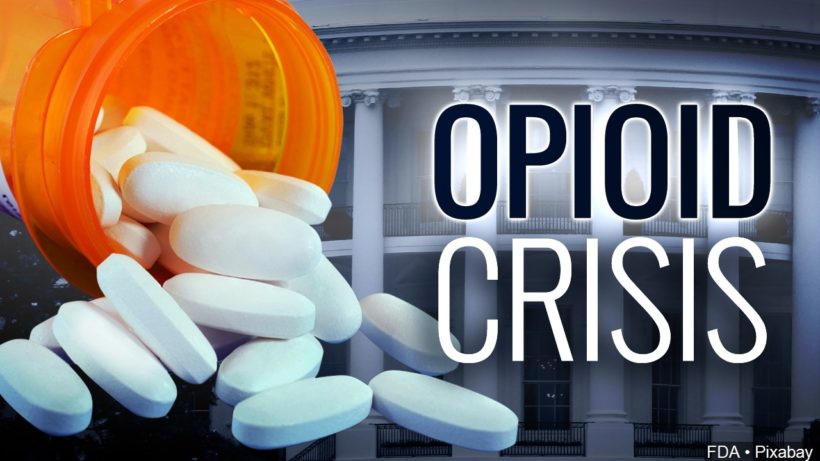President proposes death penalty for some drug dealers

President Trump visited Manchester Community College in New Hampshire on Monday to discuss measures his administration will take to combat the opioid crisis – including a call for drug traffickers to face the death penalty in cases of fatal opioid overdoses.
“If we don’t get tough on the drug dealers we’re wasting our time, and that toughness includes the death penalty,” Trump said. “Some of these drug dealers will kill thousands of people during their lifetime…and they’ll get caught and they’ll get 30 days in jail or they’ll go away for a year or they’ll be fined,” he told the crowd, pointing out that a murderer who shoots only one person can get life in prison or the death penalty.
“This isn’t about ‘nice’ anymore. This isn’t about committees. This isn’t about let’s get everybody and have dinners and let’s have everybody go to a blue-ribbon committee and everybody gets a medal for frankly talking and doing nothing,” Trump said.
“We can have all the blue-ribbon committees we want, but if we don’t get tough on the drug dealers we’re wasting our time. Just remember that. We’re wasting our time.”
President Trump’s message to drug dealers was, “If you break the law and illegally peddle these deadly poisons, we wilsidentPl find you, we will arrest you, and we will hold you accountable.”
Attorney General Jeff Sessions issued a statement on the president’s directive that the Justice Department will “use federal law to seek the death penalty wherever appropriate.”
Mr. Trump’s plan to combat the opioid crisis will focus on three areas:
- law enforcement and interdiction
- prevention and education through a sizable advertising campaign
- improving the ability to fund treatment through the federal government and help those impacted by the epidemic find jobs while fighting the addiction
The White House’s newly announced plan focuses on stiffening penalties for drug dealers as well taking steps to prevent people from getting addicted in the first place and increasing federal funding to help addicts get a second chance. The president said he wants to see solutions to the “general drug crisis” as well as the problems caused by opioids.
Some of the concrete steps the administration said it will take include increasing federal funding for non-addictive painkillers as well as shutting down illegal online marketplaces. The Department of Justice will also look into suing drug companies that may be guilty of misleading buyers about the risks of addiction.
The president has urged prosecutors to impose “really, really powerful penalties for the really bad pushers and abusers.”
Sessions announced a new DOJ task force last month to investigate opioid-related lawsuits involving deceptive marketing practices. “Our Department of Justice is looking very seriously into bringing major litigation against some of these drug companies,” President Trump said.
The least expensive measure is a “large-scale rollout of commercials” showing the deadly effects of opioids and other drugs, the president said. A new website, crisisnextdoor.gov, will provide a way for the public to share stories about addiction.
The president also addressed the lack of access to treatment across the country by promising to change a “restrictive 1970s law” that prevents Medicaid from paying for care in facilities that have more than 16 beds by providing waivers to states “to help people who need treatment now.”
In addition, the federal government will help those who have been in prison on drug charges find jobs and get back on their feet.
The president said that his administration was “pouring a lot of money” into the crisis. Congress allocated $6 billion towards the epidemic for 2018 and 2019, but it is not clear how that money will be spent yet.
The Centers for Disease Control and Prevention reported that more than 64,000 people died from drug overdoses in 2016 [of this number, 42,000 were specifically from opioid overdoses
VOCABULARY WORDS
1.Accountable/adjective: (of a person, organization, or institution) required or expected to justify actions or decisions; responsible.
2.cri·sis/noun: a time of intense difficulty, trouble, or danger.
3.Enforcement/noun: the act of compelling observance of or compliance with a law, rule, or obligation.
4.Interdiction/noun: the action of prohibiting or forbidding something.
5.Sizable/adjective: fairly large.
6.Epidemic/noun: a widespread occurrence of an infectious disease in a community at a particular time.
7.Prosecutor/noun: a person, especially a public official, who institutes legal proceedings against someone.
8.Impose/verb: force (something unwelcome or unfamiliar) to be accepted or put in place.
9.Investigate/verb: carry out a systematic or formal inquiry to discover and examine the facts of (an incident, allegation, etc.) so as to establish the truth.
10.Deceptive/adjective: giving an appearance or impression different from the true one; misleading.
11.Addiction/noun: the fact or condition of being addicted to a particular substance, thing, or activity.
12.Restrictive/adjective: imposing restrictions or limitations on someone's activities or freedom.
13.Opioid/noun: an opiumlike compound that binds to one or more of the three opioid receptors of the body.
QUESTIONS FOR DISCUSSION
1. In which instances does the President think convicted drug traffickers should face the death penalty?
2. What argument did President Trump make for why some drug dealers should get the death penalty?
3. List the three areas of President Trump’s plan to combat the opioid crisis in the U.S.
4. List some of the concrete steps the administration has said it will take.
5. For what reason will the Department of Justice be looking into suing some of the drug manufacturers?


